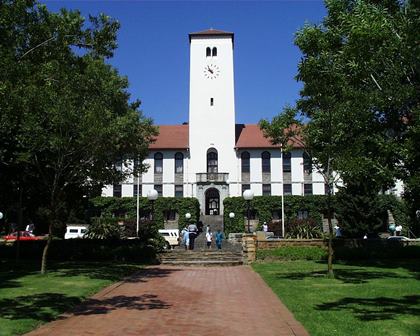Picketing has been proposed for today, 15 December, in Cape Town and Johannesburg, in response to Rhodes University’s exclusion of two students involved in the 2016 #RUReferenceList protests. Published anonymously on social media in April 2016, the list of male Rhodes University students alleged to have committed rape or sexual misconduct quickly went viral and led to prolonged protests and other actions on the campus.
After more than a year of internal hearings, the two women student activists were permanently banned from Rhodes University after courts found them guilty of criminal activity. On 12 December, reactions flooded social media.
The two students, along with many others, expressed their outrage at the verdict. Under the hashtag #Rhodeswar, they said the University had perpetuated rape culture and violence against women’s bodies – specifically those of black women.
Many of the comments criticised the University for expelling the students on the basis of their participation in protest action; however, the University has countered that they were expelled not because of their participation in protests, but on the basis of criminal actions.
In a statement released on 12 December, Rhodes University’s Communications and Advancement Division said, “The issues were ventilated in processes involving the High Court, the Supreme Court of Appeals and the Constitutional Court. The sanction against the two female students who were excluded from the University last month, which is consistent with the findings by the three courts, was meted out by an Independent Panel and is not related to them participating in protect action. It is related, instead to ‘unlawful acts’ which the courts found to have ‘made serious inroads into the rights and liberties of others’.”
The two students were finishing their final exams when they received the news. Neither is permitted to complete their degree or receive their transcripts.
One of the students spoke on radio on 12 December on Power FM and Talk 702. She said her right to a fair trial had been denied and that the case was being pursued with the support of the Socio-economic Rights Institute of South Africa (SERI).
Critics on social media compared the 10-year exclusion earlier this year of a male student found guilty of sexual assault to the permanent exclusion of the two female anti-rape activists. Talk 702 host Bongani Bingwa said the punishment was “disproportional” considering the context.
In a longer statement released later on 12 December, Rhodes said, “The two female students were found guilty by an independent panel of committing common law crimes against their fellow students, including kidnapping and assault.
“It should be noted that, contrary to claims made by the students in the media and on online platforms, none of the kidnap victims were found guilty in any forum of any form of sexual misconduct or rape, even after thorough investigations were conducted by the University and the National Prosecuting Authority.”
In November the Constitutional Court dismissed an appeal by three Rhodes University students against a December 2016 interdict granted by the high court in Grahamstown.
The three students had approached the Constitutional Court following unsuccessful attempts at the High Court and Supreme Court of Appeal.
The interdict followed actions during the students’ involvement in the #RUReference protests which the court found had “made serious inroads into the rights and liberties of others”.
Read Rhodes University’s full statement on the recent expulsions here:
http://bit.ly/RUReferenceBan


